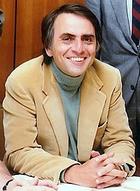
Carl Edward Sagan (New York, United States, November 9, 1934-Seattle, United States, December 20, 1996) was an American astronomer, astrophysicist, cosmologist, writer and science popularizer. He was an advocate of scientific skeptical thinking and scientific method, pioneer of exobiology, promoter of the search for extraterrestrial intelligence through the SETI Project. He promoted the sending of messages aboard space probes, destined to inform possible extraterrestrial civilizations about human culture. Through his observations of the atmosphere of Venus, he was among the first scientists to study the greenhouse effect on a planetary scale. At Cornell University, Carl Sagan was the first scientist to occupy the David Duncan Chair of Astronomy and Space Sciences, created in 1976, and was director of the Laboratory of Planetary Studies. Carl Sagan gained great popularity thanks to the award-winning documentary series of TV Cosmos: A personal journey, produced in 1980, of which he was the narrator and co-author. He also published numerous scientific articles, 1 and was the author, co-author or editor of more than twenty popular science books, the most popular being his books Cosmos, published as a complement to the series, and Contacto, on which the 1997 homonymous film. In 1978 he won the Pulitzer Prize for General Nonfiction Literature for his book The Dragons of Eden. Throughout his life, Sagan received numerous awards and decorations for his work as a communicator of science and culture. Today he is considered one of the most charismatic and influential disseminators of science, thanks to his ability to transmit scientific ideas and cultural aspects to the non-specialized public with simplicity that is not exempt from rigor.




